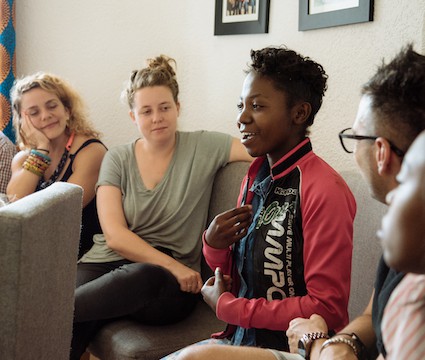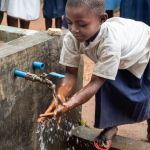The (Business) Case for Confidence: Why Unlocking Women’s Self-Confidence Should be a Major Development Priority
Emilienne, 23, is a young university student from the Northern province of Rwanda. She used to be withdrawn at school, believing that girls couldn’t perform as well as boys. Emilienne then attended a workshop at Resonate, where our 2-day intensive trainings unlock the self-confidence of women in East Africa. During the workshop, she learned to identify her values and strengths, to set goals and to see herself as a leader.
After the workshop, she became more confident and engaged in tackling community issues. She organized a meeting with her female classmates and successfully inspired them to participate more in class. She started and led an initiative in her church choir to raise money for new uniforms. She has taken on a bigger role in her family decisions, speaking up when she once kept quiet. By building her confidence, Emilienne has improved the quality of her education, her involvement in her family’s decision-making, and her engagement in her community.
Evidence shows that building self-confidence is important – especially for women like Emilienne. Confidence affects how we interact with our colleagues, how we present ourselves to people we’re meeting for the first time, and how we perceive ourselves and our capabilities.
It’s also critical to the business and development sectors.
Making Empowerment More Than A Buzzword

Emilienne, a Resonate workshop participant.
As a fairly recent graduate in international relations, I have found that the stories of women like Emilienne answer a lot of the critical questions I had as a student. The international development case studies I read about in class revealed how inequitable power structures are maintained under the guise of benevolent intentions and institutions. This left me feeling lost and pessimistic about how to move forward as a development practitioner. But through my work at Resonate over the past year, I’ve seen that building women’s self-confidence actualizes the truest definition of that often ill-defined development buzzword: empowerment.
Traditional development, and its burgeoning subfield of social entrepreneurship, is leaving impact on the table without the valuation and integration of women’s self-confidence into programming. From the Greenbelt Movement to the Liberian women’s peace movement to #MeToo, empowered, confident women continue to be some of the most effective drivers of social, political and economic change. But as recent research and opinion pieces have asserted, women’s empowerment does not occur in a vacuum and it is not limited to economic outcomes. Women and girls must have the self-confidence, and the leadership and self-advocacy that come with it, to overcome challenges and lead fulfilling lives.
Reaching Women Through a B2B Model
At Resonate, we use confidence-building workshops to accelerate the progress of women and girls. Through a business-to-business (B2B) model, we don’t just work with women like Emilienne, we work with the development programs they’re enrolled in. We partner with organizations providing technical skills or education, and they hire us to deliver and integrate our leadership workshops into their programs. This structure ensures that women and girls don’t just have access to skills and resources, but that they also have the self-confidence to realize their full potential. By charging clients for our workshops, rather than operating solely as a non-profit, we are working to sustainably create a market that values women’s empowerment.
Our B2B model enables us to amplify the impact of our clients. One of these clients, a handbag factory, told us that when something is wrong in the production line, the female artisans will now report the problem – something that never happened before our workshops. This has not only increased the overall productivity of the factory, it has also allowed the artisans to apply their agency. And as a result of our trainings in local secondary schools, we’ve seen young girls initiate community projects, actively participate in classes and expand their idea of what is possible.
We are deliberately complementing, rather than competing with, existing programs to drive deeper impact for women and girls. A 2017 end-of-year random sample survey of our workshop participants showed that 38 percent have started businesses, 45 percent have taken on a leadership role, and 24 percent have gotten a new job, promotion or academic opportunity. We have trained more than 5,000 participants and have worked with more than 50 partners in East Africa, ranging from local NGOs to the UN Food and Agriculture Organization. From politics to public health, all sectors are better off when women are confident advocates for themselves and their communities.
The Challenges of Men and Measurement
Despite my newly positive outlook on human capital development, Resonate’s approach has not come without its existential challenges. We are often faced with a valid question, “Why don’t you engage men and boys in your work?” While our workshops are co-ed at times, our work addresses the gendered confidence gap and therefore necessarily targets women and girls. Nevertheless, we have started thinking about how to intentionally engage men and boys in our work. For example, masculine norms in Rwanda dictate that men should not express their problems or emotions in public. Our workshops create spaces for participants to be vulnerable and develop their interpersonal skills, something we believe could help construct a healthier concept of masculinity that would allow men to better support gender equality. But this is something we’re still trying to prototype without significantly shifting efforts away from our core programming.
We’ve also learned that measuring this work is hard. The international development sector has an array of tools to track and standardize quantifiable economic outcomes. However, such institutionalized tools are lacking when it comes to measuring less straight-forward, but equally important outcomes like self-confidence and leadership. We are still striving to figure out the best way to measure the impact of our work, but we have come a long way. We’ve identified key indicators, such as leadership roles or academic advancement, that provide measurable ways to assess impact. Our qualitative impact stories are also critical to building our evidence base. And we will be conducting a full-scale randomized control trial at the end of 2018 with researchers from Georgetown University to externally analyze our impact. This will build the knowledge base about women’s personal transformation, which could help the development and business sectors to better value efforts to boost women’s self-confidence and aspirations.
As we navigate these challenges and delve further into this uncharted nexus of women’s self-confidence, business, and international development, we remain motivated by Emilienne and the thousands of other women that we work with. When we followed up with her to check on her progress after our workshop and see what was next for her she told us, “I believe that everything is possible.”
And because of women like Emilienne, we do too.
Megan Madeira works at Resonate as a Communications and Development Fellow.
Photos courtesy of Resonate.
- Categories
- Education, Social Enterprise



